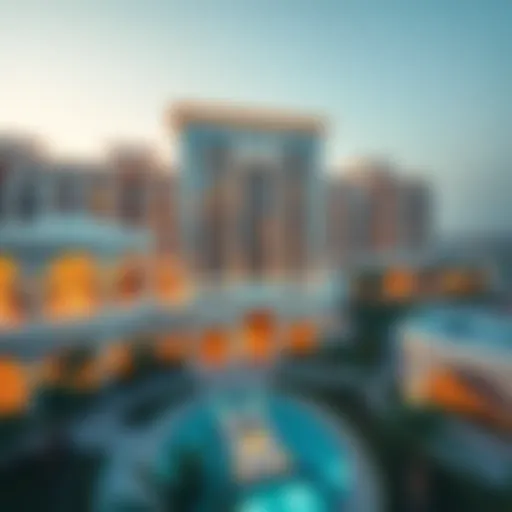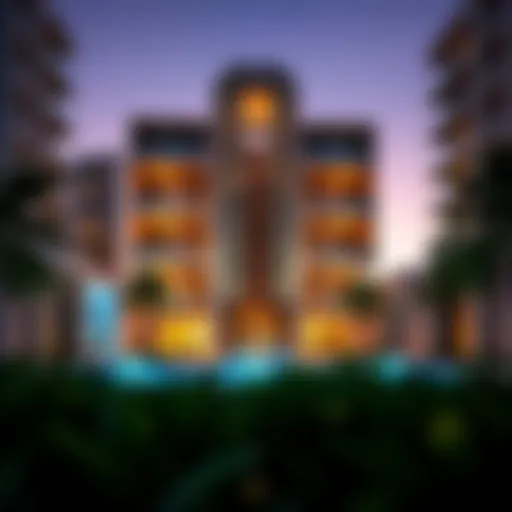Timing and Observance of Ramadan 2023 in Dubai
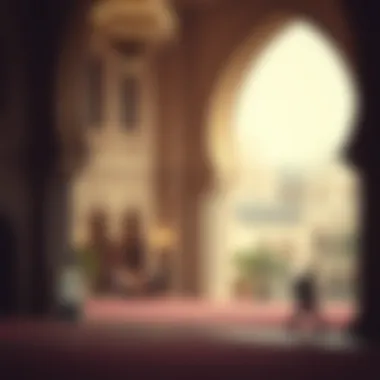

Intro
Ramadan, a cherished month for Muslims worldwide, offers a unique rhythm and cadence to life, particularly in culturally rich cities like Dubai. As 2023 rolls around, understanding the timings for fasting and prayer can be invaluable for both residents and visitors. In this guide, we aim to illuminate the significance of these timings within the framework of local customs and practices. The role that Ramadan plays in shaping daily routines and social engagements cannot be underestimated. By comprehensively researching this topic, we present insights that will cater especially to investors and homebuyers keen on immersing themselves in the local lifestyle during this holy month.
With its distinct blend of modernity and tradition, Dubai serves as an exemplary backdrop for observing Ramadan. From unique communal experiences to local economic impacts, the month of fasting has profound implications for residents and businesses alike.
Whether you are keen on understanding the nuances of the fasting schedule, exploring the socio-economic shifts, or contemplating real estate investments, the information laid out in this article will guide you through the essential aspects of Ramadan in Dubai. Expect to uncover valuable details on how local customs affect daily life and consider the market opportunities that emerge during this sacred time.
Understanding Ramadan: A Cultural Overview
Ramadan holds profound significance for millions of Muslims around the world. It is not merely a month of fasting; it stands as a time for spiritual reflection, increased devotion, and worship. The timing of Ramadan, especially in a vibrant city like Dubai, dovetails seamlessly into the daily rhythm of life and echoes throughout the community. This overview aims to enlighten readers about the essence of Ramadan and its cultural backdrop specific to this dynamic metropolis.
Historical Significance of Ramadan
The roots of Ramadan trace back to nearly 1,400 years ago when Prophet Muhammad is said to have received the first revelations of the Quran. This historical milestone marked a turning point in Islamic tradition and created a ritual that would be echoed through generations.
During Ramadan, Muslims commemorate the Night of Decree (Laylat al-Qadr), believed to be when the Quran was first spoken to the Prophet. This night, said to be better than a thousand months, carries enormous weight, prompting deeper spiritual contemplation. Comprehending the historical depth of Ramadan not only enhances understanding but helps set the stage for its observance in modern times.
Religious Observances and Practices
Various traditions come alive during this holy month. The most recognizable practice is fasting from dawn until dusk, known as saum. This involves abstaining from food, drink, and other physical needs throughout the daylight hours. Some practices include:
- Suhoor: The pre-dawn meal, which is crucial as it sustains individuals through the day.
- Iftar: The evening meal at sunset, often a communal affair that breaks the fast, typically beginning with dates and water.
- Increased prayer and reading of the Quran, with many committing to complete its recitation by month’s end.
These observances create a rhythm that infuses spirituality within the community, urging individuals to reconnect with their faith and engage in charity, known as zakat.
Cultural Variations in Observance
While the essence of Ramadan is shared universally among Muslims, the way it unfolds can differ significantly across cultures, providing a rich tapestry of observance, even within a cosmopolitan city like Dubai. For instance:
- In North Africa, family gatherings during iftar may include traditional dishes unique to the region.
- In South Asia, celebrations often involve vibrant markets and community events, accompanied by lively gatherings.
- Dubai acts as a melting pot, showcasing elements from various cultures, leading to a unique blend of Arabic traditions and international influences.
This cultural diversity not only enriches the Ramadan experience but also highlights the unifying force of faith among varied backgrounds.
Understanding these elements lays the groundwork for appreciating the intricate observance of Ramadan, especially in a bustling hub like Dubai where traditions and modernity coexist.
Timing of Ramadan in
Understanding the timetable for Ramadan is crucial for both locals and visitors in Dubai. This is a month of fasting, prayer, and reflection, deeply rooted in the Islamic faith. Knowing the precise timing allows for a smoother observance of rituals, from the pre-dawn meal (Suhoor) to the evening meal (Iftar).
Timing also has a broader impact on social and commercial activities in the city. It affects business hours, dining options, and communal gatherings, thereby influencing day-to-day life in Dubai. This section will delve into the specifics of the Ramadan timetable for 2023, providing both clarity and context for those observing this significant month.
Start and End Dates
Ramadan in 2023 is anticipated to commence on the evening of March 23, continuing until April 21. These dates are subject to the sighting of the moon, a tradition that emphasizes community and religious observance. The variation in the lunar calendar means some individuals may initiate fasting a day earlier or later, depending on local customs and moon sighting practices.
"Ramadan is not just a month of fasting; it’s a season of spiritual renewal."
The exact start and finish of Ramadan can dramatically shape personal and professional plans for people in Dubai. For instance, families may schedule vacations or events around these dates, while businesses adjust their hours to accommodate those who are fasting.
It's essential for those living or working in Dubai to be mindful of these dates, as they will guide the rhythm of daily life for the entire month.
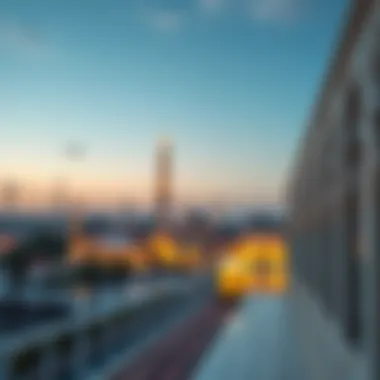

Daily Fasting Schedule
Each day of Ramadan involves a rigorous schedule. Fasting commences at Fajr, which varies based on the location and can range from around 4:30 AM to 5:00 AM in Dubai. Those observing Ramadan partake in the pre-dawn meal, Suhoor, which is crucial for sustaining energy through the day's fast.
As the sun sets, the fast is broken at Maghrib. In 2023, this will typically occur at approximately 6:40 PM to 6:50 PM, again varying slightly by day. Families and friends often come together to enjoy Iftar, sharing meals that symbolize unity and togetherness.
The routine of fasting is about more than abstaining from food; it encourages self-discipline, reflection, and empathy for those in need. Many find solace in prayer and spiritual activities after breaking their fast, enriching the overall experience of Ramadan.
Incorporating awareness of local customs and timings into one’s daily regimen is essential for fostering a sense of community during this holy month.
The Role of Fajr and Maghrib Timings
Ramadan is a period where the timings of daily prayers take on heightened significance, particularly the Fajr and Maghrib prayers. These specific prayer times are not merely ritualistic aspects of the faith; they provide a framework for the daily lives of those observing the fast. The precision in timing adds structure and meaning to the repetitive cycle of fasting. For many residents and visitors in Dubai, aligning daily activities with these festivities can enhance both the spiritual and communal experience of Ramadan.
Understanding Fajr: The Pre-Dawn Meal
Fajr, the prayer performed at dawn, signals the beginning of the fasting day. It is crucial for individuals to partake in the Suhoor, the pre-dawn meal, to sustain them through the hours without food and drink. This meal not only prepares the body for the fast but also holds social value as families often gather before dawn to eat together.
The timing for Fajr in Dubai can vary throughout Ramadan; therefore, knowing the exact time is imperative. This initial prayer time varies from day to day, and different mosques and Islamic centers often provide this timing based on astronomical calculations specific to location.
Having a good Suhoor is critical. Foods high in protein and complex carbohydrates are popular choices, as they provide lasting energy. Hydration, too, is vital; people generally aim to drink plenty of water until close to Fajr to mitigate the thirst that may come later in the day. In towns and cities where Fajr is observed, the ambience shifts at this hour. Street vendors selling baked goods come to life, bustling with activity as they prepare for a day of fasting ahead.
"The challenge of fasting is met daily at Fajr, merging bodily needs with spiritual intent."
Maghrib: The Evening Meal and Its Importance
Maghrib prayer is performed just after sunset, marking the end of the fasting day. At this time, families break their fast with dates and water, as is tradition, followed by a meal which is often a display of delightful variety. The timing of Maghrib is significant, as it symbolizes not just the end of a fast, but the beginning of communal gatherings and the sharing of food, which is a core aspect of Ramadan.
In Dubai, the timing for Maghrib can also shift with the days. Local Islamic authorities and mosques provide updated timings, often accompanied by communal calls to prayer that resonate through the streets, luring families to come together for Iftar, the meal that breaks the fast. Restaurants and hotels often offer special Ramadan iftar menus, encouraging locals and tourists alike to partake in this communal feast.
The importance of Maghrib goes beyond just breaking the fast; it encapsulates the ethos of Ramadan—togetherness. Sharing an Iftar meal connects families, friends, and the broader community, creating bonds that thrive during this holy month.
Living in Dubai During Ramadan
Changes in the Daily Rhythm
Living in Dubai during Ramadan introduces a unique cadence to daily life, resulting in noticeable shifts for both residents and visitors. The holy month encourages a sense of community while demanding adjustments in routine. For many, the day begins with the Fajr prayer, leading to the pre-dawn meal known as Suhoor. This meal not only provides nourishment for the day ahead but also serves as a communal gathering where families connect before embarking on a day of fasting.
As the sun rises higher in the sky, the pace of life slows. Many businesses operate on altered hours, with mornings extending longer and afternoons turning languid. Shops and services may shut down or reduce their operational timelines right around lunchtime. This shift can feel challenging for those working shift patterns or managing daily errands. However, it’s often a time of reflection and tranquillity, as both locals and expatriates transition to a more subdued lifestyle, fully embracing the spirit of the month.
Evenings come alive with energy. Before sunset, a palpable excitement fills the air as people prepare for Iftar—the breaking of the fast. Families typically gather to share meals, which may include a variety of traditional dishes. Participating in these meals is often seen as a cherished family and community affair, adding depth to the cultural experience of Ramadan.
“In Dubai, Ramadan is not just a month of fasting; it unfolds as a testament to the bonds that tie the community together.”
Business Hours and Services Adjustments
The holy month also brings significant adjustments to business operations and community services. Understanding these changes can greatly enhance one’s experience living or visiting during Ramadan.
- Businesses and Corporate Hours: Many companies adopt shorter work hours, typically shifting to a schedule that starts later in the morning and wraps up earlier in the day. For instance, the traditional workday may begin around 10 AM and conclude by 3 PM. This allows employees, many of whom are fasting, to ease into the day without much strain.
- Retail and Service Adjustments: Retail hours transform in sync with Ramadan’s rhythms, with many stores staying open later in the evening to cater to the community after Iftar. It's during these late-night hours that shopping malls, restaurants, and cafés gain momentum. Expect longer lines and busier outlets as locals and tourists alike flock to experience Ramadan offers and communal dining experiences.
- Public Services: Government offices also adjust their working hours accordingly. Understanding these nuances can prevent delays in administrative tasks or transactions conducted during this period.
In summary, living in Dubai during Ramadan transforms everyday life, embedding deeper cultural understanding and community interaction into daily routines, though it certainly requires flexibility and awareness of altered business practices. Families and friends come together, not just to break fast but also to share in the collective experience of reflection, hospitality, and connection.


For more insights on the practices during Ramadan in Dubai, you might explore resources such as Wikipedia or Britannica.
Exploring Community Celebrations
Community celebrations during Ramadan serve as a pivotal aspect of the cultural fabric in Dubai. They foster a sense of unity among Muslims and invite diverse participation from all communities within the emirate. These celebrations are not merely events, but heartfelt expressions of faith, hospitality, and joy. In Dubai, where a blend of cultures converges, various activities resonate deeply, allowing for a richer understanding of Ramadan’s essence beyond personal devotion.
Iftar Gatherings: Community Spirit
Iftar, the evening meal to break the fast, is more than just a meal; it’s a robust community affair. Across Dubai, families and friends gather in homes, parks, and mosques, sharing food and fellowship. Local mosques often organize large community iftars, welcoming anyone who wishes to join. This openness emphasizes not only the importance of sharing meals but also inclusivity. Visitors, expats, and tourists often find themselves embraced by warm hospitality during these gatherings. The potent aroma of dishes wafting through the air is something special.
"Sharing food during Ramadan is a way to collect memories and create bonds that hold communities tightly together."
Furthermore, many restaurants offer special iftar menus, catering to those who may not celebrate Ramadan but wish to experience this cultural hallmark. This pushes the business sector to innovate and adapt, bringing flavors and diverse culinary experiences to the forefront. There’s a palpable buzz in the air, with laughter and recounting of stories, adding to the zest of the evening.
Religious Activities and Events
The month of Ramadan is rich in religious activities that flourish throughout Dubai. From nightly Taraweeh prayers held in mosques to charitable events dedicated to aiding the less fortunate, these activities strengthen the spiritual backbone of the community.
Masjids across Dubai become hubs not just for prayer, but for learning and dialogue. Many host lectures or seminars featuring local scholars who educate attendees on the significance of Ramadan and its teachings. These gatherings allow for the exchange of ideas, fostering an atmosphere of spirituality and reflection.
- Charity Drives: During this holy month, the emphasis on giving is heightened. Charitable organizations ramp up their efforts to provide food, clothing, and shelter to those in need.
- Cultural Festivals: Some neighborhoods offer cultural fairs that include art, crafts, and traditional performances, bringing a sense of festivity to the streets. Visitors can witness traditional music and dance, which narrate stories of faith and heritage.
- Interfaith Initiatives: In the spirit of unity, certain events are organized to bring different faiths together to discuss common ground and mutual respect.
Emphasizing the values of restraint, compassion, and community, these religious activities deepen one’s understanding of not just the observance of Ramadan, but also of the UAE’s rich multicultural tapestry.
Market Impact During Ramadan
Ramadan is not just a month of spiritual reflection but it also has a significant impact on market dynamics within Dubai. Businesses adjust their strategies to align with both consumer behavior and local customs during this period. The changing landscape is worth understanding for anyone involved in the market, whether as an investor, home buyer, or property manager.
The shifts in consumer consumption patterns during Ramadan offer opportunities and challenges to businesses. For instance, there is often a spike in demand for food and beverage items, especially as families gather to break their fasts in the evening. This cultural nuance can shape inventory practices, and companies in the food sector often ramp up their offerings in anticipation of the Iftar rush.
Similarly, retail and e-commerce experience alterations in traffic and sales volume. Fasting hours affect shopping habits—many people prefer to shop after sunset, leading to longer lines at stores and increased online sales as folks prefer the convenience. These behavioral adaptations necessitate marketing strategies that resonate with customers during this holy month.
Consumer Behavior Changes
During Ramadan, changes in consumer behavior are starkly evident and can be multifaceted. People typically shift their priorities, favoring communal meals and experiences over individual purchases. This collective spirit often manifests in:
- Increased spending: Families may allocate larger budgets for Iftar meals, boosting demand for traditional foods and treats.
- Shift to Online Shopping: Many choose to browse products online, avoiding the busy stores during peak hours.
- Promotions and Discounts: Retailers frequently offer special promotions aimed at Ramadan, which can entice shoppers to spend more than usual.
“Consumer trends during Ramadan illustrate how adaptability is essential for staying relevant in a dynamic marketplace.”
Given these changes, understanding the psyche of the consumer becomes vital. It’s not merely about selling products; it's about fostering an emotional connection with potential buyers through culturally sensitive marketing and product offerings.
Real Estate Market Considerations
When it comes to real estate, Ramadan can also cast its influence, leading to various shifts and considerations. While many individuals might think property transactions stall during the fasting month, often quite the opposite occurs. Here's how Ramadan impacts the real estate market:
- Increased Interest in Properties: As families gather more during Ramadan, it can awaken interest in home buying or renting to accommodate larger gatherings. Investors might see a spike in inquiries for larger residential properties as people plan for family visits.
- End of Year Timing: Many expatriates and investors plan to settle before the year’s end to enjoy the holiday season. Consequently, Ramadan can be a pivotal time for residential sales and leases.
- Investment Opportunities: Commercial properties often see a rise in interest because Ramadan is also a lucrative time for businesses, especially in sectors that cater to the dining experience.
In summary, businesses and investors in Dubai must remain vigilant and adaptable. The prevailing cultural sentiments and behavioral shifts during Ramadan can offer both challenges and exceptional opportunities in the market. A nuanced approach, responsive to the rhythm of the holy month, can resonate widely and yield fruitful results for those attuned to the evolution of consumer tastes and preferences.
Traveling in Dubai During Ramadan
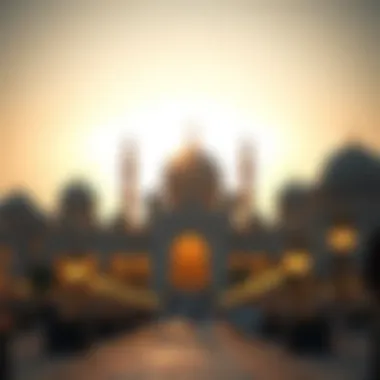

Navigating the vibrant city of Dubai during Ramadan can be a unique experience, offering visitors an opportunity to immerse themselves in the rich culture of the UAE. Travelers will find that this month creates a distinct atmosphere, blending traditional practices with modern conveniences. Understanding the nuances of traveling during this holy month is crucial for ensuring a respectful and enjoyable trip, whether you're here for business or pleasure.
In Ramadan, while the pace of life adapts to accommodate the fasting schedules, there are also ample opportunities for exploration and engagement with the community. The local residents are often more willing to share their traditions, and visitors can participate in celebrations that reflect the essence of this significant time.
Tips for Visitors
When visiting Dubai during Ramadan, there are several things to keep in mind:
- Plan Your Meals: As many restaurants may alter their hours, it’s wise to research dining options ahead of time. Many establishments close during daylight hours, but several offer Iftar meals, breaking the fast in the evening. Checking locations that provide Iftar buffets enriched with a mix of traditional and international cuisine can enhance your experience.
- Dress Modestly: Respect for local culture is key. Visitors should opt for loose-fitting clothes that cover the arms and legs. This is not only a sign of respect but will make your interactions with residents more positive.
- Timing is Everything: Being mindful of greeting times and events is important. Consider scheduling your activities around the prayer timings, especially Fajr and Maghrib. Those are the times when residents are most focused on their spiritual practices.
- Explore Local Markets: The souks and local markets come alive after sunset. Strolling through the marketplaces provides a taste of local life and an opportunity to try street food that brims with flavors.
- Join Community Events: Seek out public Iftar gatherings and community events. Participating in these can give visitors a deeper understanding of Ramadan’s significance and foster connections with locals.
"Experiencing Ramadan in Dubai can be a transformative encounter, shedding light on local spirit and customs like nothing else."
Navigating Local Customs
For visitors, understanding local customs during Ramadan is essential not only for personal comfort but also for maintaining respectful interactions with residents. Key customs to keep in mind include:
- Fasting Awareness: All Muslims fast from dawn to sunset. Eating, drinking, or smoking in public during daylight hours is considered disrespectful. Some cafes may offer take-out but generally will not serve those items within the visible premises.
- Avoid Loud Music and Profanity: Keeping noise levels low is appreciated. Engaging in loud activities or using inappropriate language is often frowned upon and can draw negative attention.
- Respect Prayer Times: The five daily prayers occur throughout the day, with special attention given to the Maghrib prayer at sunset, marking the end of fasting. Many businesses close briefly to allow employees to observe their prayers, so plan accordingly.
- Share the Awareness: If you're in a group with friends or colleagues who are fasting, it's courteous to adapt to their schedule, particularly when meeting for meals. Embracing the experience fosters inclusivity and strengthens bonds no matter your background.
By keeping these tips and customs in mind, visitors to Dubai can navigate the cultural landscape during Ramadan with sensitivity and respect. The month not only offers insight into the local traditions but also enhances one’s experience of this remarkable city.
Health and Wellbeing During Fasting
Fasting during Ramadan is often viewed through the lens of spirituality, but its implications on health and wellbeing shouldn't be overlooked. Understanding how to navigate this month in a way that supports physical and mental health is vital—not just for the individual, but for families and communities as a whole. The act of fasting offers abundant opportunities for introspection and rejuvenation, providing a holistic approach to one's overall wellbeing.
Nutritional Considerations
When it comes to fasting, nutritional choices play a pivotal role in maintaining energy levels and overall health. The meals consumed during Iftar and Suhoor can significantly affect one's health throughout the day. Here are several crucial elements to consider:
- Hydration: Dehydration can be a common issue during fasting months. It's essential to drink plenty of water during non-fasting hours. Aim for at least eight glasses from Iftar until Suhoor to stay hydrated.
- Balanced Meals: Focus on incorporating a mix of proteins, healthy fats, and complex carbohydrates in your meals. For instance, dishes like grilled chicken with quinoa and assorted vegetables are both nourishing and sustaining.
- Avoid Processed Foods: While tempting, sugary and fried foods can lead to energy crashes. Instead, opt for fruits and nuts that provide natural sugars and necessary nutrients.
- Moderation is Key: As satisfying as it may be to indulge after a long day of fasting, overeating can lead to discomfort or sluggishness. It's best to eat mindfully and in moderate portions.
- Cultural Dishes: Many Emirati dishes, such as Harees and Falafil, can be both traditional and nutritious. They often incorporate ingredients that are beneficial during fasting, providing the body with essential nutrients.
Maintaining a focus on your nutritional requirements will go a long way in ensuring both physical vitality and enjoyment during Ramadan.
Mental Health and Mindfulness
Fasting is not only about abstaining from food; it also offers a unique opportunity for mental clarity and mindfulness. As the day unfolds, practitioners find space to reflect on their thoughts, goals, and overall mental state. Some key aspects to consider include:
- Stress Management: The fast can be a period of reflection, replacing daily distractions with moments of stillness. Engaging in meditation or deep-breathing exercises can help alleviate stress and anxiety.
- Community Connection: Engaging in shared Iftar meals can foster feelings of camaraderie and unity, enhancing social bonds. Relationships can be strengthened, providing emotional support during the fasting period.
- Mindful Eating: Focus on being present during meals. Savor every bite during Iftar and Suhoor, allowing yourself to appreciate the flavors and efforts involved. This mindfulness can extend beyond meals, impacting daily interactions and experiences.
- Setting Intentions: Ramadan is a time for personal growth. Set intentions at the beginning of the month to develop positive habits or focus on self-improvement. These intentions can guide you through both fasting and daily life outside of Ramadan.
- Seek Support: It's essential to communicate your needs and feelings with family and friends. Sharing experiences and challenges faced during fasting can lighten the emotional load while strengthening relationships.
Fasting during Ramadan is a rich tapestry of physical and mental experiences. By paying attention to both health and wellbeing, individuals can navigate this holy month with ease and grace, maximizing its benefits for the body, mind, and spirit.
Ending: Ramadan's Role in the Dubai Experience
The significance of Ramadan in Dubai extends beyond mere fasting; it encompasses a full spectrum of cultural, spiritual, and social dimensions. As residents and visitors immerse themselves in the atmosphere during this holy month, they often find that it fosters deeper connections within the community, promotes understanding of Islamic traditions, and shapes the overall experience of living in one of the world's most vibrant cities.
Reflection on Community and Faith
Ramadan acts as a beacon for reflection and unity among the diverse population of Dubai. Every evening, as the sun sets and the call to Maghrib signals the end of the day's fast, families and friends gather to break their fast together, often sharing food and stories. The iftar meals are a grand demonstration of community spirit. For many, it’s not just about eating; it’s about reconnecting with family values, rekindling faith, and extending kindness to neighbors. In this melting pot of cultures, the emphasis on community bonding during Ramadan showcases the inclusivity of Dubai’s society.
Furthermore, mosques across the city open their doors wide to both Muslims and non-Muslims, inviting them to engage in cultural dialogues and learn more about the significance of Ramadan. This gives rise to a universal appreciation for the values of compassion, charity, and togetherness. The month serves as a reminder that faith can be a shared experience, fostering broad appreciation, ultimately creating a shared identity within a multicultural environment.
Future Perspectives on Ramadan in the UAE
Looking ahead, it’s compelling to consider how the observance of Ramadan might evolve in the UAE. With rapid advancements in technology and shifts in global dynamics, social aspects and communal observances are likely to undergo notable changes.
One can foresee the integration of more technological solutions, such as apps that streamline the scheduling of iftar and suhoor timings based off accurate photo readings of Ramadan dates. Additionally, food delivery services might continue to flourish, specifically tailored to provide iftar meals from various restaurants, catering to the diverse palate found in Dubai.
Moreover, as Dubai continues to position itself as a hub for tourism and investment, the observance of Ramadan is likely to draw even more international attention. This may lead to cultural festivals that not only celebrate Islamic traditions but also reflect the city’s cosmopolitan spirit, encouraging visitors to experience the holy month from a local perspective.



